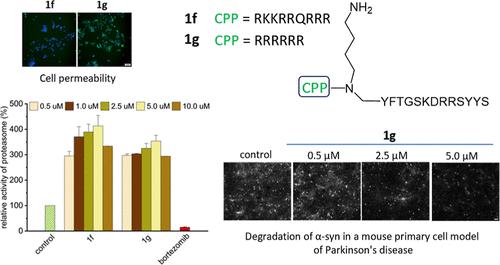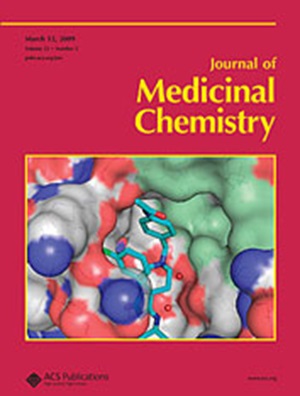Peptidomimetics Activating the Proteasome: A New Perspective for Parkinson’s Treatment
IF 6.8
1区 医学
Q1 CHEMISTRY, MEDICINAL
引用次数: 0
Abstract
The development of age-related neurodegenerative diseases is associated with the accumulation of damaged and misfolded proteins. Such proteins are eliminated from cells by proteolytic systems, mainly by 20S proteasomes, whose activity declines with age. Its stimulation has been recognized as a promising approach to delay the onset or ameliorate the symptoms of neurodegenerative disorders. Here we present peptidomimetics that are very effective in stimulating the proteasome in biochemical assays and in cell culture. They are stable in human plasma and capable of penetrating the cell membranes. The activators demonstrated the ability to enhance h20S degradation of α-synuclein and tau, whose aggregates are involved in the development of Parkinson’s and Alzheimer’s diseases, respectively. The peptidomimetics did not show cytotoxicity to HEK293T and primary hippocampal cells. Additionally, these compounds were highly effective in reducing the amount of phosphorylated α-synuclein aggregates in hippocampal neurons in a mouse embryonic cell model.

激活蛋白酶体的拟肽制剂:帕金森病治疗的新视角
与年龄相关的神经退行性疾病的发展与受损和错误折叠蛋白质的积累有关。这些蛋白质通过蛋白水解系统从细胞中清除,主要是通过20S蛋白酶体,其活性随着年龄的增长而下降。它的刺激已被认为是一种有希望的方法来延缓发病或改善神经退行性疾病的症状。在这里,我们提出了在生化分析和细胞培养中非常有效地刺激蛋白酶体的肽模拟物。它们在人体血浆中是稳定的,并且能够穿透细胞膜。激活剂能够增强h20S降解α-突触核蛋白和tau蛋白的能力,α-突触核蛋白和tau蛋白的聚集分别参与帕金森病和阿尔茨海默病的发展。模拟肽对HEK293T和原代海马细胞没有细胞毒性。此外,这些化合物在减少小鼠胚胎细胞模型海马神经元磷酸化α-突触核蛋白聚集体的数量方面非常有效。
本文章由计算机程序翻译,如有差异,请以英文原文为准。
求助全文
约1分钟内获得全文
求助全文
来源期刊

Journal of Medicinal Chemistry
医学-医药化学
CiteScore
4.00
自引率
11.00%
发文量
804
审稿时长
1.9 months
期刊介绍:
The Journal of Medicinal Chemistry is a prestigious biweekly peer-reviewed publication that focuses on the multifaceted field of medicinal chemistry. Since its inception in 1959 as the Journal of Medicinal and Pharmaceutical Chemistry, it has evolved to become a cornerstone in the dissemination of research findings related to the design, synthesis, and development of therapeutic agents.
The Journal of Medicinal Chemistry is recognized for its significant impact in the scientific community, as evidenced by its 2022 impact factor of 7.3. This metric reflects the journal's influence and the importance of its content in shaping the future of drug discovery and development. The journal serves as a vital resource for chemists, pharmacologists, and other researchers interested in the molecular mechanisms of drug action and the optimization of therapeutic compounds.
 求助内容:
求助内容: 应助结果提醒方式:
应助结果提醒方式:


